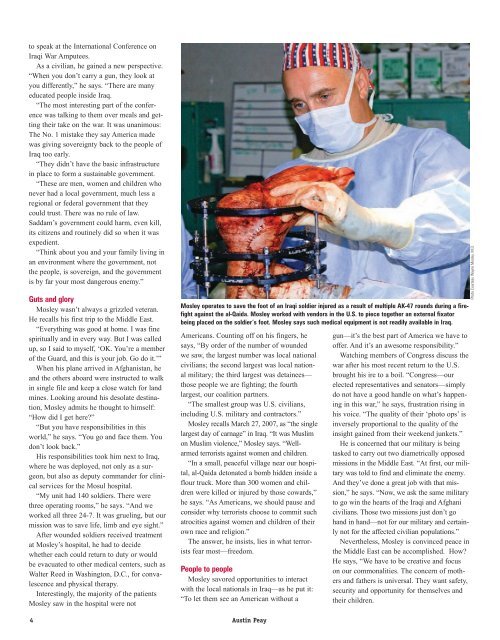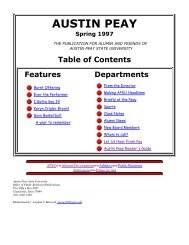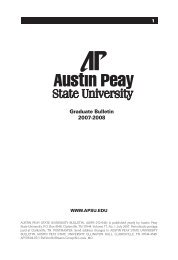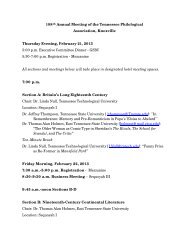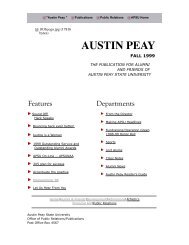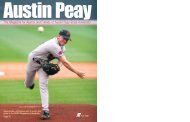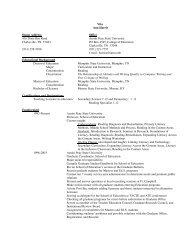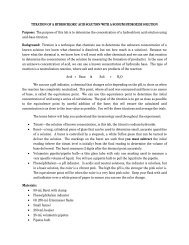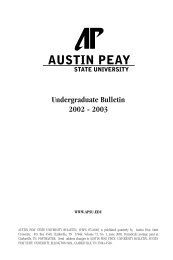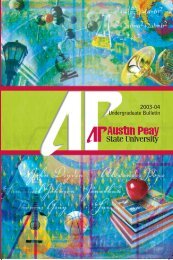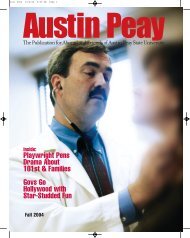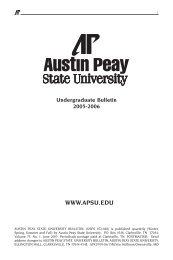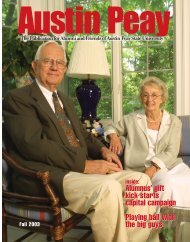Fall 2008 - Austin Peay State University
Fall 2008 - Austin Peay State University
Fall 2008 - Austin Peay State University
You also want an ePaper? Increase the reach of your titles
YUMPU automatically turns print PDFs into web optimized ePapers that Google loves.
to speak at the International Conference on<br />
Iraqi War Amputees.<br />
As a civilian, he gained a new perspective.<br />
“When you don’t carry a gun, they look at<br />
you differently,” he says. “There are many<br />
educated people inside Iraq.<br />
“The most interesting part of the conference<br />
was talking to them over meals and getting<br />
their take on the war. It was unanimous:<br />
The No. 1 mistake they say America made<br />
was giving sovereignty back to the people of<br />
Iraq too early.<br />
“They didn’t have the basic infrastructure<br />
in place to form a sustainable government.<br />
“These are men, women and children who<br />
never had a local government, much less a<br />
regional or federal government that they<br />
could trust. There was no rule of law.<br />
Saddam’s government could harm, even kill,<br />
its citizens and routinely did so when it was<br />
expedient.<br />
“Think about you and your family living in<br />
an environment where the government, not<br />
the people, is sovereign, and the government<br />
is by far your most dangerous enemy.”<br />
Guts and glory<br />
Mosley wasn’t always a grizzled veteran.<br />
He recalls his first trip to the Middle East.<br />
“Everything was good at home. I was fine<br />
spiritually and in every way. But I was called<br />
up, so I said to myself, ‘OK. You’re a member<br />
of the Guard, and this is your job. Go do it.’”<br />
When his plane arrived in Afghanistan, he<br />
and the others aboard were instructed to walk<br />
in single file and keep a close watch for land<br />
mines. Looking around his desolate destination,<br />
Mosley admits he thought to himself:<br />
“How did I get here?”<br />
“But you have responsibilities in this<br />
world,” he says. “You go and face them. You<br />
don’t look back.”<br />
His responsibilities took him next to Iraq,<br />
where he was deployed, not only as a surgeon,<br />
but also as deputy commander for clinical<br />
services for the Mosul hospital.<br />
“My unit had 140 soldiers. There were<br />
three operating rooms,” he says. “And we<br />
worked all three 24-7. It was grueling, but our<br />
mission was to save life, limb and eye sight.”<br />
After wounded soldiers received treatment<br />
at Mosley’s hospital, he had to decide<br />
whether each could return to duty or would<br />
be evacuated to other medical centers, such as<br />
Walter Reed in Washington, D.C., for convalescence<br />
and physical therapy.<br />
Interestingly, the majority of the patients<br />
Mosley saw in the hospital were not<br />
Mosley operates to save the foot of an Iraqi soldier injured as a result of multiple AK-47 rounds during a firefight<br />
against the al-Qaida. Mosley worked with vendors in the U.S. to piece together an external fixator<br />
being placed on the soldier’s foot. Mosley says such medical equipment is not readily available in Iraq.<br />
Americans. Counting off on his fingers, he<br />
says, “By order of the number of wounded<br />
we saw, the largest number was local national<br />
civilians; the second largest was local national<br />
military; the third largest was detainees—<br />
those people we are fighting; the fourth<br />
largest, our coalition partners.<br />
“The smallest group was U.S. civilians,<br />
including U.S. military and contractors.”<br />
Mosley recalls March 27, 2007, as “the single<br />
largest day of carnage” in Iraq. “It was Muslim<br />
on Muslim violence,” Mosley says. “Wellarmed<br />
terrorists against women and children.<br />
“In a small, peaceful village near our hospital,<br />
al-Qaida detonated a bomb hidden inside a<br />
flour truck. More than 300 women and children<br />
were killed or injured by those cowards,”<br />
he says. “As Americans, we should pause and<br />
consider why terrorists choose to commit such<br />
atrocities against women and children of their<br />
own race and religion.”<br />
The answer, he insists, lies in what terrorists<br />
fear most—freedom.<br />
People to people<br />
Mosley savored opportunities to interact<br />
with the local nationals in Iraq—as he put it:<br />
“To let them see an American without a<br />
gun—it’s the best part of America we have to<br />
offer. And it’s an awesome responsibility.”<br />
Watching members of Congress discuss the<br />
war after his most recent return to the U.S.<br />
brought his ire to a boil. “Congress—our<br />
elected representatives and senators—simply<br />
do not have a good handle on what’s happening<br />
in this war,” he says, frustration rising in<br />
his voice. “The quality of their ‘photo ops’ is<br />
inversely proportional to the quality of the<br />
insight gained from their weekend junkets.”<br />
He is concerned that our military is being<br />
tasked to carry out two diametrically opposed<br />
missions in the Middle East. “At first, our military<br />
was told to find and eliminate the enemy.<br />
And they’ve done a great job with that mission,”<br />
he says. “Now, we ask the same military<br />
to go win the hearts of the Iraqi and Afghani<br />
civilians. Those two missions just don’t go<br />
hand in hand—not for our military and certainly<br />
not for the affected civilian populations.”<br />
Nevertheless, Mosley is convinced peace in<br />
the Middle East can be accomplished. How?<br />
He says, “We have to be creative and focus<br />
on our commonalities. The concern of mothers<br />
and fathers is universal. They want safety,<br />
security and opportunity for themselves and<br />
their children.<br />
Photo Courtesy Wayne Mosley, M.D.<br />
4 <strong>Austin</strong> <strong>Peay</strong>


